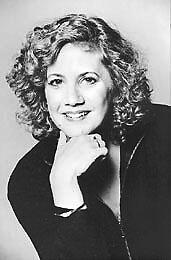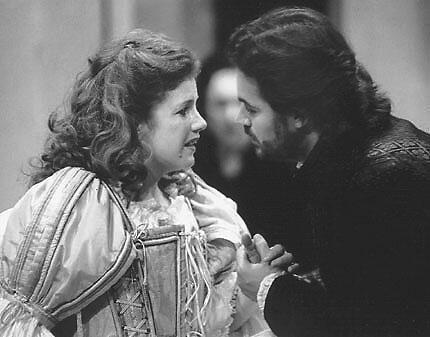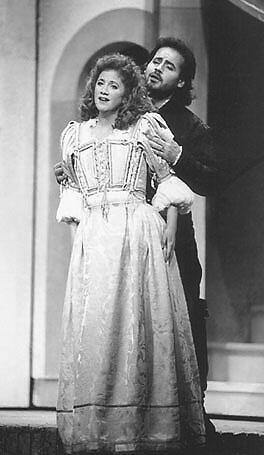Donna Brown Comes Home by Wah Keung Chan and Philip Anson
/ February 1, 1998
Version française...
CANADIAN SINGERS IN EUROPE: Part
I
 After twenty years in Europe cultivating an
international career in recital, oratorio and opera, Canadian
soprano Donna Brown has moved back to her home town of Ottawa.
Shuttling to and fro between her career in Paris and her significant
other in Ottawa was taking its toll, but Brown also feels it is a
good time for singers in Canada. "Opportunities are increasing in
the Canadian music world," she says. "Canada continues to produce an
incredible number of really good singers with great local and
international careers. I think more Canadian singers are being hired
than back in the 1980s." (photo: Colette
Masson/Enguerand) After twenty years in Europe cultivating an
international career in recital, oratorio and opera, Canadian
soprano Donna Brown has moved back to her home town of Ottawa.
Shuttling to and fro between her career in Paris and her significant
other in Ottawa was taking its toll, but Brown also feels it is a
good time for singers in Canada. "Opportunities are increasing in
the Canadian music world," she says. "Canada continues to produce an
incredible number of really good singers with great local and
international careers. I think more Canadian singers are being hired
than back in the 1980s." (photo: Colette
Masson/Enguerand)
Brown's return is
certainly a plus for the Canadian music scene. We'll now get to hear
more of the voice that has enchanted European maestros like John
Eliot Gardiner, Helmuth Rilling and Kent Nagano. Last July Donna's
solo in Beethoven's Ninth Symphony at the Lanaudière Festival
gave us a sample of her vibrant, floating, clear soprano voice. In
March she will sing her first Rosina in Rossini's The Barber of
Seville with Opera Lyra Ottawa. "I love acting in comedies and I
have fun singing coloratura roles. Opera is good therapy: you get to
do things on stage that you wouldn't dare do in real life."
Donna Brown grew up
in Ottawa where she took private lessons in voice, piano and theory.
After graduating from McGill University she studied in France and
Austria. "I originally went to Paris for a summer course and it was
so interesting I decided to stay." She has fond memories of her
Paris student days, sneaking into concerts for free during
intermission. Brown supported herself for a couple of years working
in the film section of the Canadian embassy. "I didn't want to get a
choir job because I didn't think my voice could handle it."
Many young singers
train as apprentices in opera companies but Brown started her career
on the recital circuit. She made her Paris debut at the Canadian
 embassy, which led to many more small venue recitals.
"Making a living as a recitalist was not easy in Canada at that
time. In Europe in the 1980s there were numerous opportunities for
beginners in small venues and with small chamber orchestras, many of
which unfortunately no longer exist." embassy, which led to many more small venue recitals.
"Making a living as a recitalist was not easy in Canada at that
time. In Europe in the 1980s there were numerous opportunities for
beginners in small venues and with small chamber orchestras, many of
which unfortunately no longer exist."
Brown's first operatic experience was singing Micaela in Peter
Brook's 1982-83 tour of La tragédie de Carmen. "I just
loved being onstage, so in 1984 I got an agent and started
auditioning for opera houses," she remembers. Before long she landed
the role of Papagena. Since then Brown's career has blossomed, with
many performances of Pamina, Sophie (in Der Rosenkavalier)
and recently Gilda. She attributes her success to continuous
studying (she coaches twice a year in Venice), hard work, and
adaptability to different conductors' instructions. Brown's
discography of 14 titles includes several world premieres of
unfamiliar works. She performed and recorded Debussy's unfinished
opera Rodrigue et Chimène (Erato) with Kent Nagano and the
Opéra de Lyon forces. She toured and recorded Haydn Masses, recorded
Leclair's Scylla et Glaucus and Berlioz' Messe
Solenelle, all with John Eliot Gardiner. Although Brown's busy
recital and oratorio schedule leaves her less time to sing opera
these days, she is satisfied with the balance. (Donna Brown as Gilda and Jose Bose as the Duke, Verdi:
Rigoletto, Opera de Montepellier, 1995, photo:
Marc Ginot)
 During her European years Brown's voice
filled out and darkened. Technically, she learned the importance of
proper breathing to achieve optimum projection. "You have to avoid
pushing with the diaphragm. Placement is the key to maximum sound
with minimum effort." Brown loves to pass on her learning in
masterclasses (she has just given two in Edmonton and Calgary), but
she is not yet ready to teach regularly. During her European years Brown's voice
filled out and darkened. Technically, she learned the importance of
proper breathing to achieve optimum projection. "You have to avoid
pushing with the diaphragm. Placement is the key to maximum sound
with minimum effort." Brown loves to pass on her learning in
masterclasses (she has just given two in Edmonton and Calgary), but
she is not yet ready to teach regularly.
Having returned to
Ottawa, Brown plans to spend about half her time working in Canada.
"Europe is fantastic because of the great tradition and great
conductors, but Canada is making a lot of progress too." Having
established a primarily European reputation means Brown must build
up her North American contacts from scratch. Her Rosina will be her
first appearance on a Canadian operatic stage since her Servilia in
Mozart's La Clemenza di Tito with the Canadian Opera Company
in 1991.
Brown is clearly at
a happy point in her personal and professional life. She makes time
for healthy hobbies including Tai Chi, piano playing, reading,
skating, cross-country skiing, swimming and biking. "Having lived
all over the world I realize what a great country Canada is. People
here are more relaxed and spontaneous. I love the seasons. Deep down
I always hoped I would someday return to live in Canada." (Donna Brown as Gilda and Jose Bose as the Duke, Verdi:
Rigoletto, Opera de Montepellier, 1995, photo:
Marc Ginot)
Donna Brown
sings Rosina (soprano version) in Rossini's The Barber of
Seville, Opera Lyra Ottawa, March 14, 16, 18, 21, 1998, at 8
p.m. Information: (613) 233-9200. On May 4, 8 p.m., Ms. Brown will
sing two Viktor Ullmann song cycles in a special Radio-Canada
concert commemorating the birth of the composer to be held at St.
Joseph's Church in Alymer, Quebec, accompanied by pianist Andrew
Tunis. The concert will be recorded for later broadcast.
Version française... |
|


